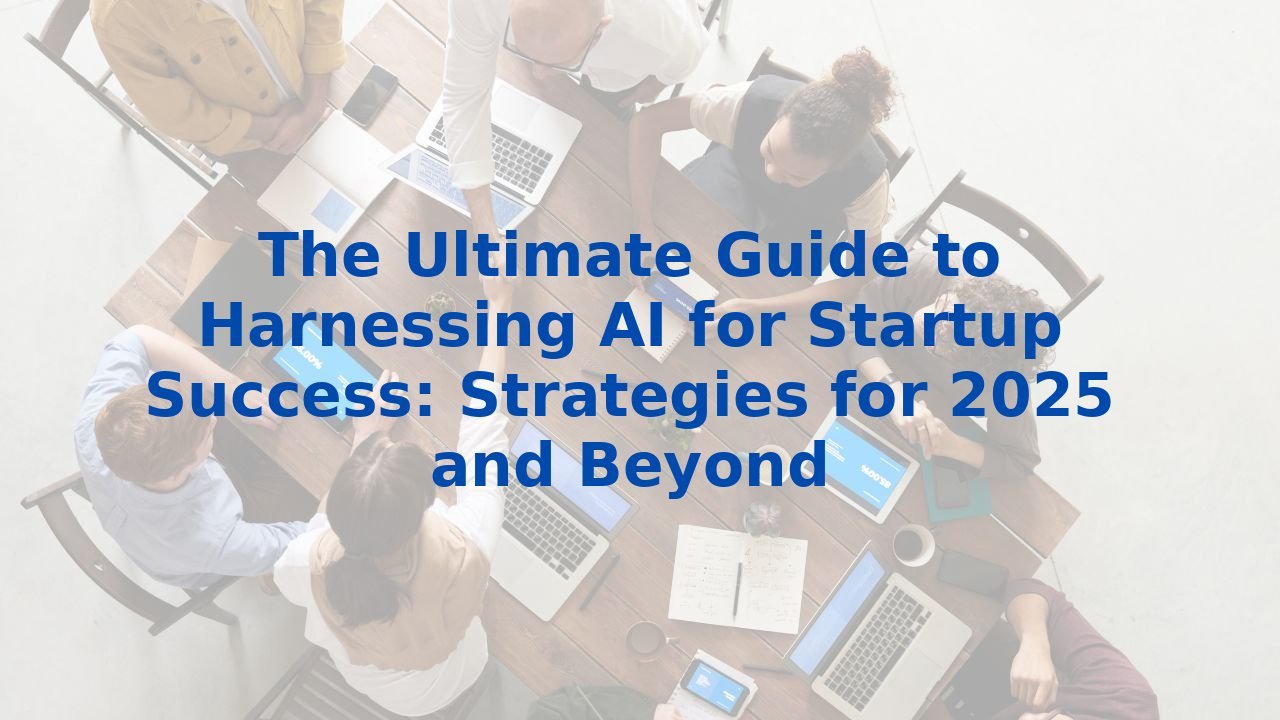The Ultimate Guide to Harnessing AI for Startup Success: Strategies for 2025 and Beyond
The Ultimate Guide to Harnessing AI for Startup Success: Strategies for 2025 and Beyond
Introduction
In today's rapidly changing landscape, startups face both challenges and opportunities. Amid economic uncertainties and technological advancements, it's clear that innovation is the heartbeat of sustainable success. Enter Artificial Intelligence (AI)—a potent ally that is transforming the way startups function. In this guide, we will delve into how AI can enhance business processes, drive efficiency, and prepare organizations for a future where adaptability is key.
1. Enhanced Decision-Making
One of AI's most profound impacts lies in refining decision-making processes. Startups often grapple with the vast amounts of data generated daily. AI technologies empower organizations to harness this data by analyzing it at lightning speed. The insights generated reveal critical patterns, enabling founders to make data-backed decisions with confidence. Whether it's optimizing inventory in retail or forecasting market trends, AI can illuminate paths that are hidden to the naked eye, transforming uncertainty into opportunity.
2. Increased Efficiency and Productivity
Imagine a workplace where routine tasks are no longer a burden on your team. That’s the promise of AI. By automating mundane responsibilities, startups can significantly streamline operations. This shift doesn’t merely save time; it reallocates human resources to focus on strategy, creativity, and growth. Tasks like data entry, scheduling, and basic customer service inquiries can be efficiently managed by AI systems, which opens up new avenues for innovation and allows teams to engage in value-adding activities.
3. Improved Customer Experience
In a world where personalization is paramount, AI stands as a beacon for enhancing customer engagement. Startups can leverage AI to gather insights about consumer behavior, enabling tailored marketing efforts that resonate with individual users. Imagine chatbots that efficiently manage customer interactions 24/7 or recommendation engines that curate experiences unique to each user. This not only raises customer satisfaction but fosters loyalty, creating a community of advocates for your brand.
4. Cost Savings and Resource Optimization
Every startup knows the importance of keeping an eye on costs. AI contributes profoundly to this aspect by automating processes that traditionally consume resources. Consider how AI-driven logistics improve supply chain efficiency by accurately predicting demand. Such foresight reduces waste and ensures optimal inventory levels. When tasks that required extensive human oversight can be efficiently managed by algorithms, businesses not only cut costs but also foster a culture of resourcefulness.
5. Innovation and Competitive Advantage
AI is more than just a tool; it's a catalyst for innovation. By analyzing vast datasets, startups can identify trends and opportunities that would otherwise remain obscured. This capability enables your team to push boundaries, developing new products or enhancing existing ones. In fast-paced markets, the ability to adapt and predict for future needs can indeed be the differentiator between leading and lagging behind. The success stories abound—companies employing AI have not only improved product quality but capitalized on market gaps with agility.
6. Better Quality and Reduction of Human Error
Amid the desire for speed and efficiency, maintaining quality is non-negotiable. Here, AI shines through its precision. By integrating AI-driven solutions into processes, startups can ensure tasks are executed consistently and without the common pitfalls of human error. Whether it’s in financial reporting or customer data management, employing AI leads to enhanced accuracy, fostering trust and reliability in your brand.
Training Employees for AI: The Key to Success
While the advantages of AI are numerous, its true potential is only realized with a workforce equipped to harness its capabilities. This is where AI training comes into play:
- Skill Development: Training ensures your employees possess the requisite skills to work alongside AI technologies, increasing their adaptability and versatility.
- Empowerment: Familiarity with AI tools empowers your team to navigate and leverage these technologies to optimize workflows and drive results.
- Innovation Drive: Well-trained employees become innovation champions, finding new ways to utilize AI that align with your organization’s goals.
Investing in comprehensive AI training for your workforce isn’t just beneficial; it’s essential for thriving in the future economy. Consider exploring diverse training options that cater to different roles within your organization to maximize impact.
Conclusion
The fusion of AI into business processes is not merely a trend; it's a strategic imperative. By enhancing decision-making, boosting efficiency, optimizing customer experiences, and driving innovation, AI empowers startups to navigate the complexities of modern markets with confidence. As we step into 2025 and beyond, organizations that embrace AI and invest in training their teams will not only survive but thrive in this exhilarating era of transformation.
For more insights on how to equip your workforce with necessary AI skills, check out available resources through Complete AI Training.



